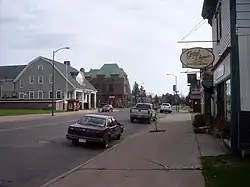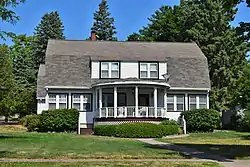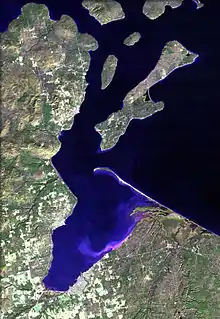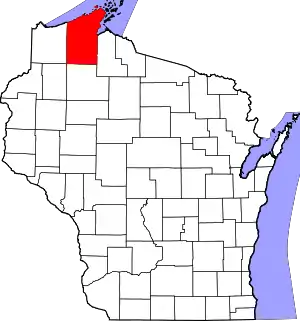Washburn, Wisconsin | |
|---|---|
 The main street (Bayfield Street / WIS 13) in downtown Washburn | |
 Location of Washburn in Bayfield County, Wisconsin. | |
| Coordinates: 46°40′26″N 90°53′52″W / 46.67389°N 90.89778°W | |
| Country | |
| State | |
| County | Bayfield |
| Government | |
| • Type | Mayor–council |
| • Mayor | Mary D. Motiff |
| Area | |
| • Total | 3.92 sq mi (10.14 km2) |
| • Land | 3.91 sq mi (10.13 km2) |
| • Water | 0.00 sq mi (0.01 km2) |
| Elevation | 692 ft (211 m) |
| Population | |
| • Total | 2,051 |
| • Density | 524.2/sq mi (202.4/km2) |
| Time zone | UTC-6 (Central (CST)) |
| • Summer (DST) | UTC-5 (CDT) |
| ZIP Code | 54891 |
| Area code(s) | 715 & 534 |
| FIPS code | 55-83525[4] |
| GNIS feature ID | 1576230[2] |
| Website | www |
Washburn is a city in Bayfield County, in the U.S. state of Wisconsin. The population was 2,051 at the 2020 census.[3] The city is just east of and adjacent to the Town of Washburn. It is in northern Wisconsin, on the shore of Lake Superior's Chequamegon Bay.
Wisconsin Highway 13 and County Highway C are the main routes in the community.
History
In 1659, the French explorers Radisson and Groseilliers touched here on their trip along the south shore of Lake Superior. In 1665 the Jesuit Claude-Jean Allouez established on the shore of the bay, a short distance south of the present city, the first French mission in Wisconsin. He named it "La Pointe du Saint Esprit," and in 1669 it was placed in charge of Father Jacques Marquette. The place was visited by Daniel Greysolon (Du Luth) in 1681–1682, and here in 1693 Pierre-Charles Le Sueur built a stockaded post. In 1718 a fort was erected and a French garrison placed in it. About 1820–1821 a trading post of the American Fur Company was established in the area.[5]
The city itself was founded in 1883, named for Cadwallader C. Washburn, Republican governor of Wisconsin from 1872 until 1874.[6][7] It was chartered in 1904.[5]
Geography
Washburn is located at 46°40′26″N 90°53′51″W / 46.67389°N 90.89750°W (46.673989, -90.897674).[8]
According to the United States Census Bureau, the city has a total area of 6.17 square miles (15.98 km2), of which, 3.90 square miles (10.10 km2) is land and 2.27 square miles (5.88 km2) is water.[9]
Demographics
| Census | Pop. | Note | %± |
|---|---|---|---|
| 1890 | 3,039 | — | |
| 1910 | 3,830 | — | |
| 1920 | 3,707 | −3.2% | |
| 1930 | 2,238 | −39.6% | |
| 1940 | 2,363 | 5.6% | |
| 1950 | 2,070 | −12.4% | |
| 1960 | 1,896 | −8.4% | |
| 1970 | 1,957 | 3.2% | |
| 1980 | 2,080 | 6.3% | |
| 1990 | 2,285 | 9.9% | |
| 2000 | 2,280 | −0.2% | |
| 2010 | 2,117 | −7.1% | |
| 2020 | 2,051 | −3.1% | |
| U.S. Decennial Census[10][3] | |||
2020 census
As of the census of 2020,[3] the population was 2,051. The population density was 524.2 inhabitants per square mile (202.4/km2). There were 1,059 housing units at an average density of 270.6 per square mile (104.5/km2). The racial makeup of the city was 85.9% White, 5.2% Native American, 0.6% Black or African American, 0.2% Asian, 1.3% from other races, and 6.8% from two or more races. Ethnically, the population was 2.9% Hispanic or Latino of any race.
2010 census
As of the census[11] of 2010, there were 2,117 people, 934 households, and 531 families living in the city. The population density was 542.8 inhabitants per square mile (209.6/km2). There were 1,070 housing units at an average density of 274.4 per square mile (105.9/km2). The racial makeup of the city was 88.4% White, 0.8% African American, 5.9% Native American, 0.3% Asian, 0.6% from other races, and 4.1% from two or more races. Hispanic or Latino of any race were 1.6% of the population.
There were 934 households, of which 26.8% had children under the age of 18 living with them, 42.5% were married couples living together, 9.9% had a female householder with no husband present, 4.5% had a male householder with no wife present, and 43.1% were non-families. 38.3% of all households were made up of individuals, and 16.9% had someone living alone who was 65 years of age or older. The average household size was 2.15 and the average family size was 2.82.
The median age in the city was 45.9 years. 21.6% of residents were under the age of 18; 6.3% were between the ages of 18 and 24; 21.1% were from 25 to 44; 32.2% were from 45 to 64; and 18.8% were 65 years of age or older. The gender makeup of the city was 48.7% male and 51.3% female.
2000 census
As of the census[4] of 2000, there were 2,280 people, 938 households, and 589 families living in the city. The population density was 581.5 people per square mile (224.6/km2). There were 1,004 housing units at an average density of 256.1 per square mile (98.9/km2). The racial makeup of the city was 92.06% White, 0.18% Black or African American, 5.61% Native American, 0.44% Asian, 0.35% from other races, and 1.36% from two or more races. Hispanic or Latino of any race were 0.66% of the population. 26.8% were of German, 14.2% Norwegian, 7.1% French, 7.1% Polish, 6.7% Irish, 5.6% English and 5.5% Swedish ancestry according to Census 2000.
There were 938 households, out of which 33.0% had children under the age of 18 living with them, 45.0% were married couples living together, 13.1% had a female householder with no husband present, and 37.2% were non-families. 33.2% of all households were made up of individuals, and 13.5% had someone living alone who was 65 years of age or older. The average household size was 2.33 and the average family size was 2.97.
In the city, the population was spread out, with 26.6% under the age of 18, 6.2% from 18 to 24, 25.8% from 25 to 44, 25.2% from 45 to 64, and 16.1% who were 65 years of age or older. The median age was 40 years. For every 100 females, there were 92.2 males. For every 100 females age 18 and over, there were 89.5 males.
The median income for a household in the city was $33,257, and the median income for a family was $40,781. Males had a median income of $31,875 versus $23,235 for females. The per capita income for the city was $15,331. About 7.5% of families and 10.3% of the population were below the poverty line, including 12.3% of those under age 18 and 6.4% of those age 65 or over.
Economy
Initially, the city's economy was based on lumbering, with sawmills lining the busy waterfront. It was also a popular summer resort, being especially well known for its boating and fishing.[5] In 1905, the DuPont company opened an explosives plant just outside town, providing an important source of employment as timber resources were growing scarce. The closing of the DuPont plant in 1971 was a severe blow to the local economy.
Currently, the city's economy focuses on the tourist industry and its position as county seat.
Transportation
Bus service is provided by Bay Area Rural Transit.
Government
Washburn uses a mayor–council form of government. As of March 2020, the current mayor of Washburn is Mary Motiff.[12][13]
| Year | Republican | Democratic | Third parties |
|---|---|---|---|
| 2020 | 24.9% 320 | 73.6% 944 | 1.5% 19 |
| 2016 | 27.0% 329 | 65.2% 792 | 7.7% 94 |
| 2012 | 24.5% 290 | 74.1% 878 | 1.4% 17 |
| 2008 | 26.0% 311 | 72.6% 868 | 1.4% 17 |
| 2004 | 30.5% 383 | 67.9% 854 | 1.6% 20 |
| 2000 | 31.4% 327 | 59.6% 620 | 8.9% 93 |
Local media
Washburn receives three radio stations from Ashland; WATW, WBSZ and WJJH. Television stations come from the Duluth–Superior market; KDLH, KBJR, WDSE and WDIO.
Notable people
- Tom Blake, surfer and inventor
- Ted Buffalo, NFL player
- Walter A. Duffy, Wisconsin State Representative
- Morgan Hamm, United States gymnast
- Paul Hamm, United States gymnast
- Ernest J. Korpela, Wisconsin State Representative
- Arthur William McLeod, Wisconsin State Representative
- Robert A. Nixon, Wisconsin State Representative
- Hubert H. Peavey, U.S. Representative
- Willard Ryan, Green Bay Packers football coach
- Wayne Simoneau, Minnesota State Representative
- Vic C. Wallin, Wisconsin State Representative
- Charles Watson, Wisconsin State Representative
Images
 City hall
City hall Sign
Sign Ranger station for Chequamegon-Nicolet National Forest
Ranger station for Chequamegon-Nicolet National Forest A house located in the East Third Street Residential Historic District
A house located in the East Third Street Residential Historic District
References
- ↑ "2019 U.S. Gazetteer Files". United States Census Bureau. Retrieved August 7, 2020.
- 1 2 U.S. Geological Survey Geographic Names Information System: Washburn, Wisconsin
- 1 2 3 4 "2020 Decennial Census: Washburn city, Wisconsin". data.census.gov. U.S. Census Bureau. Retrieved July 15, 2022.
- 1 2 "U.S. Census website". United States Census Bureau. Retrieved January 31, 2008.
- 1 2 3 One or more of the preceding sentences incorporates text from a publication now in the public domain: Chisholm, Hugh, ed. (1911). "Washburn". Encyclopædia Britannica. Vol. 28 (11th ed.). Cambridge University Press. p. 344.
- ↑ "Washburn Wisconsin - History". Archived from the original on November 23, 2007. Retrieved November 11, 2007.
- ↑ Chicago and North Western Railway Company (1908). A History of the Origin of the Place Names Connected with the Chicago & North Western and Chicago, St. Paul, Minneapolis & Omaha Railways. p. 159.
- ↑ "US Gazetteer files: 2010, 2000, and 1990". United States Census Bureau. February 12, 2011. Retrieved April 23, 2011.
- ↑ "US Gazetteer files 2010". United States Census Bureau. Retrieved November 18, 2012.
- ↑ "Census of Population and Housing". Census.gov. Retrieved June 4, 2015.
- ↑ "U.S. Census website". United States Census Bureau. Retrieved November 18, 2012.
- ↑ "City of Washburn · City Council - City of Washburn". City of Washburn. Retrieved March 29, 2020.
- ↑ "Contact - City of Washburn". City of Washburn. Retrieved March 29, 2020.
- ↑ "Wisconsin election results". Lubar Center for Public Policy and Civic Education. Retrieved November 12, 2021.
External links
- City of Washburn, Wisconsin website
- Washburn Chamber of Commerce website
- Sanborn fire insurance maps: 1886 1889 1893 1898 1909 1918

